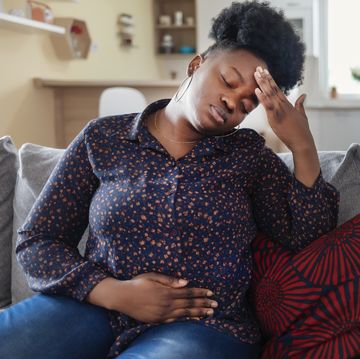If you overindulged at happy hour, it may come as no shock when you’re queasy the next morning. But this icky feeling isn’t always the direct result of imbibing too much.
Because nausea is a very nonspecific symptom, it can be an indicator of many things, which is why it’s crucial for you to keep your eye on it. "It can mean [anything from] bad pizza for lunch or it could be a sign of pancreatic cancer," says Chavi Eve Karkowsky, M.D., medical director, obstetrics and gynecology and women’s health at Montefiore Medical Group-Comprehensive Care Center. "If it’s persistent or impeding your ability to sustain nutrition, you should see a doctor. That’s why it’s really important to pay attention to your body."
Read on for some unexpected (yet common) reasons why your stomach may be feeling a bit off.
1. You Suffer from Migraines
Head pounding? Karkowsky says nausea sometimes surprisingly tags along with migraines. "Some people may not make the connection between the two," she says. (Sadly, experts still don’t know the underlying cause of migraines, so it’s unclear why nausea is often a symptom.) The good news is that anti-migraine medication may help in abating it. (Heal your whole body with Rodale's 12-day power plan for better health.)
RELATED: 7 Ways to Help Put an End to Your Life-Ruining Migraines
2. You Have "Pelvic Congestion Syndrome"
One of the most under-diagnosed but common causes of abdominal pain and nausea is something called pelvic congestion syndrome, says Christopher C. Hollingsworth, M.D., of NYC Surgical Associates. "It’s caused by venous insufficiency in the pelvis," he says. "Just like women get varicose veins in the legs, there can be abnormal dilated veins in the pelvis. These veins swell and take up space in the pelvis. These dilated veins press on the intestines, the ovaries, the uterus, and the bladder, causing a wide range of symptoms." This is commonly treated with a minimally invasive procedure, says experts.
3. You’re Stressed
Another biggie for stomach woes is stress, which can contribute to gastritis, "the inflammation of the lining of the stomach," says Deepa Iyengar, M.D., a family medicine physician with McGovern Medical School at UTHealth and Memorial Hermann-Texas Medical Center. She says it’s crucial to develop techniques to cope with the stress (like meditation or cognitive therapy) and recommends avoiding spicy foods, eating small meals regularly, and nixing caffeine to reduce the likelihood of future stomach issues.
4. You Have Gallstones
"Nausea and vomiting are two of the big signs for gallstones," says Sandra Fryhofer, M.D., past president of the American College of Physicians and a practicing internist. If you’re feeling pain in your right upper quadrant and have a high fever, get yourself to a doctor, she says. Signs you’re dealing with an ulcer or gastrointestinal bleeding include bowel movements that look like tar or vomiting up what looks like coffee grounds, says Fryhofer.
RELATED: 9 Things You Need to Know About Your Appendix
5. Your Pills Are to Blame
Fryhofer points out that birth control, vitamins, or OTC meds may often have nausea as a side effect. Before stopping cold turkey, she recommends trying to take them with food (saltines are a safe bet) or ginger ale (which can help ease a stomach ache). If the problem persists, talk to your doctor.
And One Not So Surprising Reason: You're Pregnant
OK, this isn’t exactly a shocking one, but it’s still worth mentioning. Contrary to what you may have seen in the movies, nausea is usually not one of the first signs that a baby is on board. "Context is important," says Karkowsky. "For a woman who has regular menses, she’ll begin experiencing nausea at the six-to-eight-week mark or about two to four weeks after a missed period. By that point, she may have already taken a home pregnancy test."
For a woman with a slightly irregular period, though, nausea may in fact be the first indicator that she is expecting. "Morning sickness is really common and really tough," says Karkowsky. "It can last weeks, months, or even the whole pregnancy." That said, if you’re pregnant and having trouble keeping even basic nutrition down, Karkowsky suggests seeing your doctor. Vitamin B6 or prescription medication won’t eliminate symptoms entirely, but they can help, she says.
The Bottom Line
If your nausea doesn’t have a specific cause, there are a few easy things you can do to combat it. "The best way to treat nausea without an identifiable cause is to stop anything that might be offending your stomach lining," says Hollingsworth. "Lay off cigarettes and alcohol, avoid spicy foods, and consider an antacid. Probiotics aren’t a bad idea either, [and] stick with bland foods."













